
International students, or foreign students, are students who undertake all or part of their tertiary education in a country other than their own.
Academic tenure in the United States and Canada is a contractual right that grants a teacher or professor a permanent position of employment at an academic institution such as a university or school. Tenure is intended to protect teachers from dismissal without just cause, and to allow development of thoughts or ideas considered unpopular or controversial among the community. In North America, tenure is granted only to educators whose work is considered to be exceptionally productive and beneficial in their careers.

Howard University is a private, federally chartered historically black research university in Washington, D.C., located in the Shaw neighborhood. It is classified among "R2: Doctoral Universities – High research activity" and accredited by the Middle States Commission on Higher Education.

Collin College is a public community college district in Texas. Founded in 1985, the district has grown as the county has grown from around 5,000 students in 1986 to more than 58,800 credit and noncredit students.
Willis W. Harman was an American engineer, futurist, and author associated with the human potential movement. He was convinced that late industrial civilization faced a period of major cultural crisis which called for a profound transformation of human consciousness. Over a career lasting some four decades, he worked to raise public awareness on the subject through his writings and to foster relevant research through the nonprofit research institute SRI International, the Institute of Noetic Sciences (IONS), and the World Business Academy (WBA). He served as president of IONS for two decades, and he was a cofounder of the WBA. His many books include volumes coauthored with the futurist Howard Rheingold, who put forward similar views, and the mythologist Joseph Campbell.
Futurists are people whose specialty or interest is futurology or the attempt to systematically explore predictions and possibilities about the future and how they can emerge from the present, whether that of human society in particular or of life on Earth in general.
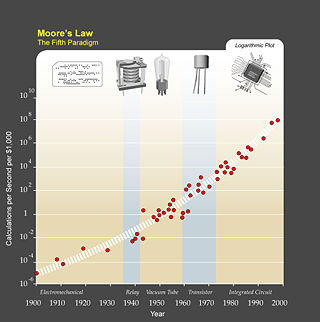
Futures studies, futures research, futurism, or futurology is the systematic, interdisciplinary and holistic study of social/technological advancement, and other environmental trends; often for the purpose of exploring how people will live and work in the future. Predictive techniques, such as forecasting, can be applied, but contemporary futures studies scholars emphasize the importance of systematically exploring alternatives. In general, it can be considered as a branch of the social sciences and an extension to the field of history. Futures studies seeks to understand what is likely to continue and what could plausibly change. Part of the discipline thus seeks a systematic and pattern-based understanding of past and present, and to explore the possibility of future events and trends.
Elaine Tuttle Hansen is an American academic administrator, scholar and university professor who served as the executive director of the Center for Talented Youth at Johns Hopkins University from 2011 to 2018 and the 8th President of Bates College from 2002 to 2011.
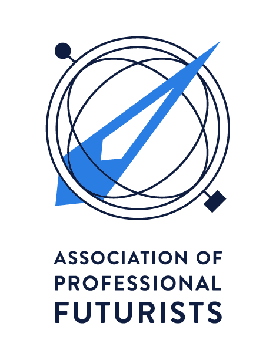
The Association of Professional Futurists (APF) was founded in 2002 to validate the competencies of emerging futurists. As analysts, speakers, managers or consultants, APF's credentialed members cultivate strategic foresight for their organizations and clients. APF represents the professional side of the futures movement, while groups such as the World Futures Studies Federation, the World Future Society or The Millennium Project, represent its academic, popular, and activists expressions, respectively.

In the United States, higher education is an optional stage of formal learning following secondary education. It is also referred to as post-secondary education, third-stage, third-level, or tertiary education. It covers stages 5 to 8 on the International ISCED 2011 scale. It is delivered at 3,931 Title IV degree-granting institutions, known as colleges or universities. These may be public or private universities, research universities, liberal arts colleges, community colleges, or for-profit colleges. U.S. higher education is loosely regulated by the government and by several third-party organizations.
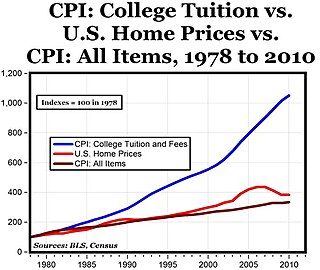
The higher education bubble in the United States is the possibility that excessive investment in higher education could have negative repercussions in the broader economy. Although college tuition payments are rising, the supply of college graduates in many fields of study is exceeding the demand for their skills, which aggravates graduate unemployment and underemployment while increasing the burden of student loan defaults on financial institutions and taxpayers. Moreover, the higher education bubble might be even more serious than load of student debts. Without safeguards in place for funding and loans, the government risks creating a moral hazard in which schools charge students expensive tuition fees without offering them marketable skills in return. The claim has generally been used to justify cuts to public higher education spending, tax cuts, or a shift of government spending towards law enforcement and national security. There is a further concern that having an excess supply of college graduates exacerbates political instability, historically linked to having a bulge in the number of young degree holders.

Sexism in academia refers to the discrimination and subordination of a particular sex or gender academic institutions, particularly universities, due to the ideologies, practices, and reinforcements that privilege one sex or gender over another. Sexism in academia is not limited to but primarily affects women who are denied the professional achievements awarded to men in their respective fields such as positions, tenure and awards. Sexism in academia encompasses institutionalized and cultural sexist ideologies; it is not limited to the admission process and the under-representation of women in the sciences but also includes the lack of women represented in college course materials and the denial of tenure, positions and awards that are generally accorded to men.

Daniel Burrus is an American technology futurist, business adviser, author, and public speaker in the areas of business strategy, global trends, and disruptive innovation. He has written on the topics of business transformation and technology-driven trends, with his book Flash Forsight becoming a New York Times Bestseller in 2011.
For-profit higher education in the United States refers to the commercialization and privatization of American higher education institutions. For-profit colleges have been the most recognizable for-profit institutions, and more recently with online program managers, but commercialization has been a part of US higher education for centuries. Privatization of public institutions has been increasing since at least the 1980s.
Andy Hines is an American futurist, head of graduate studies in Foresight at the University of Houston, and author of several books on strategic foresight. Hines is a professional futurist, co-creator of the framework foresight method, Assistant Professor and Program Coordinator of the Graduate Program in Foresight at the University of Houston, Principal of foresight consulting firm Hinesight, and former organizational futurist at Kellogg Company and Dow Chemical. He has written extensively on futures studies, strategic foresight, foresight research methods, the role of organizational futurists, and the consumer landscape.
Critical university studies (CUS) is a new field examining the role of higher education in contemporary society and its relation to culture, politics, and labor. Arising primarily from cultural studies, it takes a critical stance toward changes to the university since the 1970s, particularly the shift away from a strong public model of higher education to a neoliberal privatized model. Emerging largely in the United States, which has the most extensive system of higher education, the field has also seen significant work in the United Kingdom, as well as in other countries confronting neoliberalism. Key themes of CUS research are corporatization, academic labor, and student debt, among other issues.
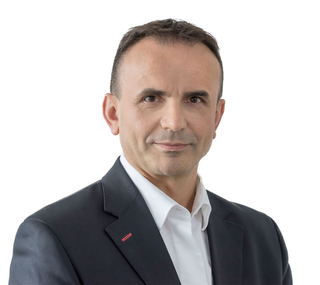
Pero Mićić is a German professor for Foresight and Strategy at Steinbeis-Hochschule Berlin, as well as author, public speaker and management consultant. He is the founder and CEO of the FutureManagementGroup AG. Mićić lives in Eltville, Germany.
Higher education in the United States is an optional stage of formal learning following secondary education. Higher education, also referred to as post-secondary education, third-stage, third-level, or tertiary education occurs most commonly at one of the 3,899 Title IV degree-granting institutions in the country. These may be public universities, private universities, liberal arts colleges, community colleges, or for-profit colleges. Learning environments vary greatly depending on not only the type of institution, but also the different goals implemented by the relevant county and state.

Dark academia is an internet aesthetic and subculture concerned with higher education, the arts, and literature, or an idealised version thereof. The aesthetic centres on traditional educational clothing, interior design, activities such as writing and poetry, ancient art, and classic literature, as well as classical Greek and Collegiate Gothic architecture. The trend emerged on social media site Tumblr in 2015, before being popularised by adolescents and young adults in the late 2010s and early 2020s, particularly during the COVID-19 pandemic.
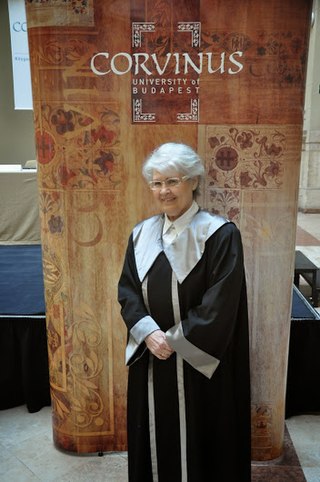
Erzsébet Nováky 2005. Academic Award. Erzsébet Nováky, Doctor of Economics, Professor, dedicated futurist since 1970, Head of the Department of Futures Research at the University of Economics 1992-2012. Corvinus University of Budapest, professor emeritus (2015).
















